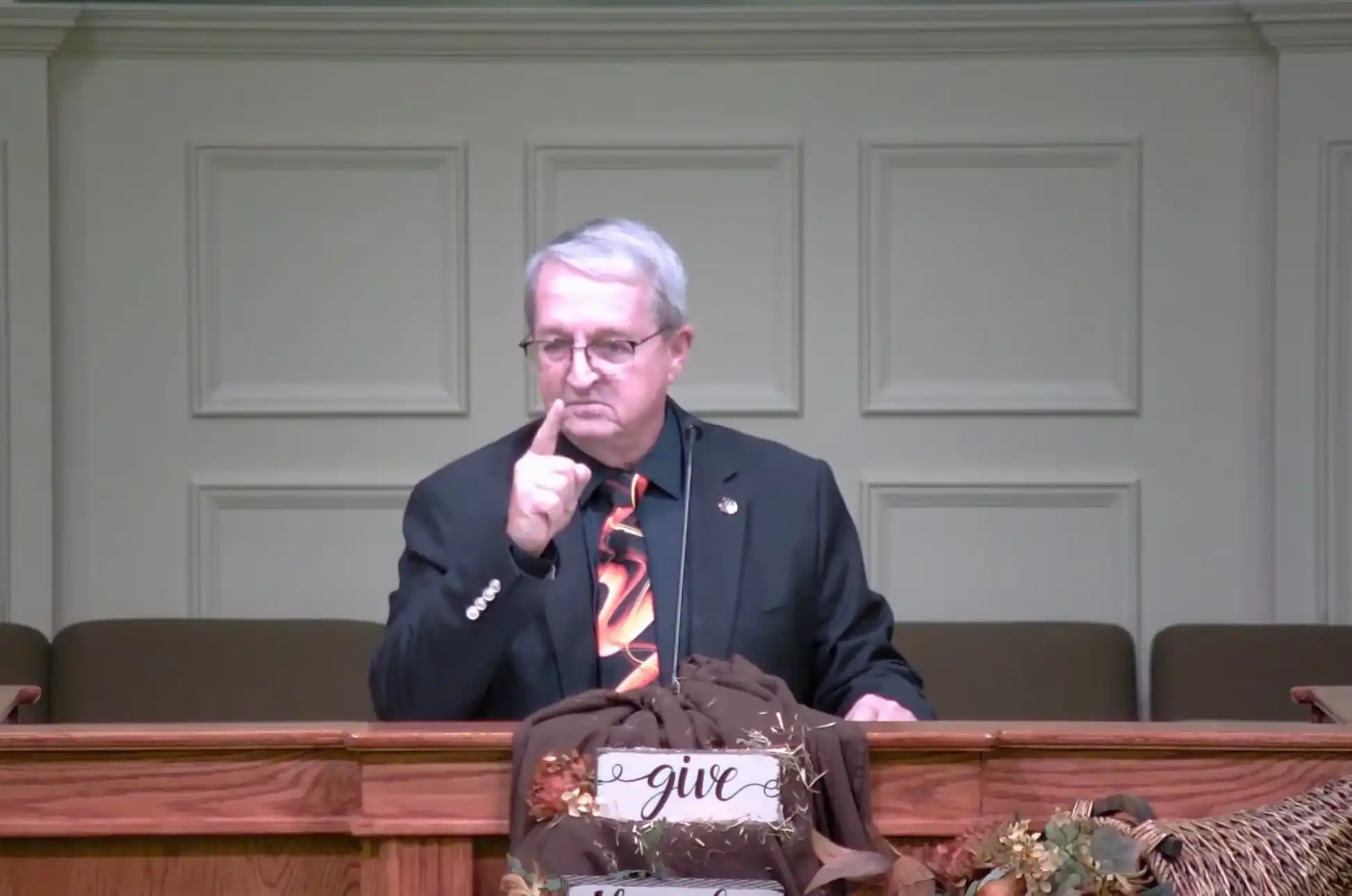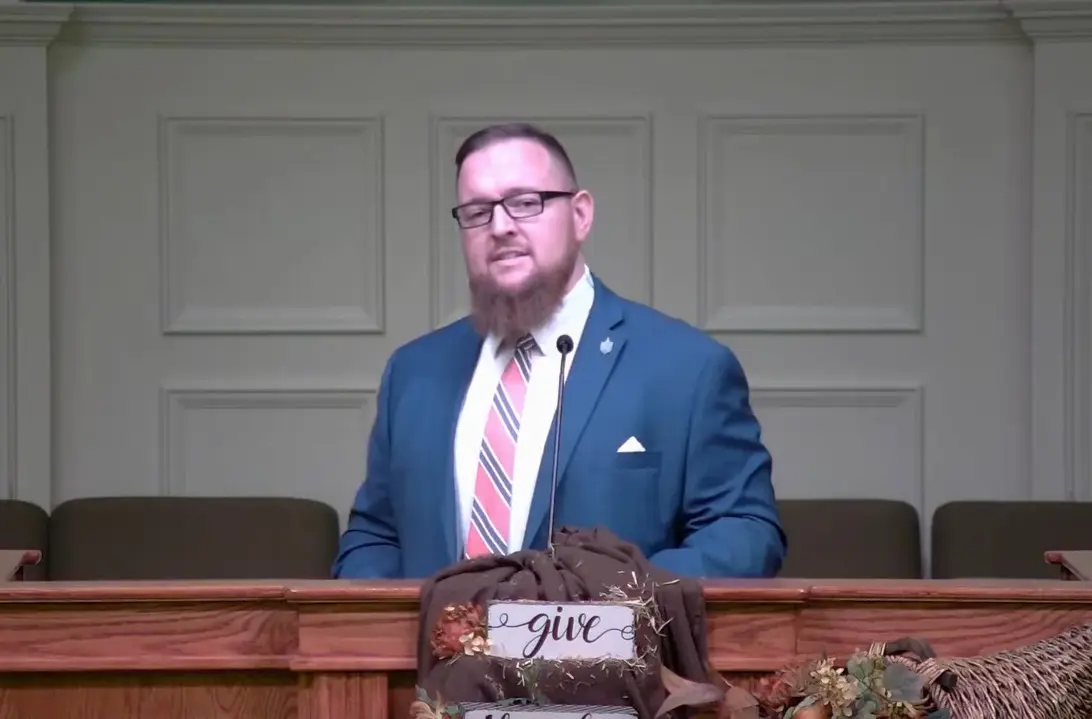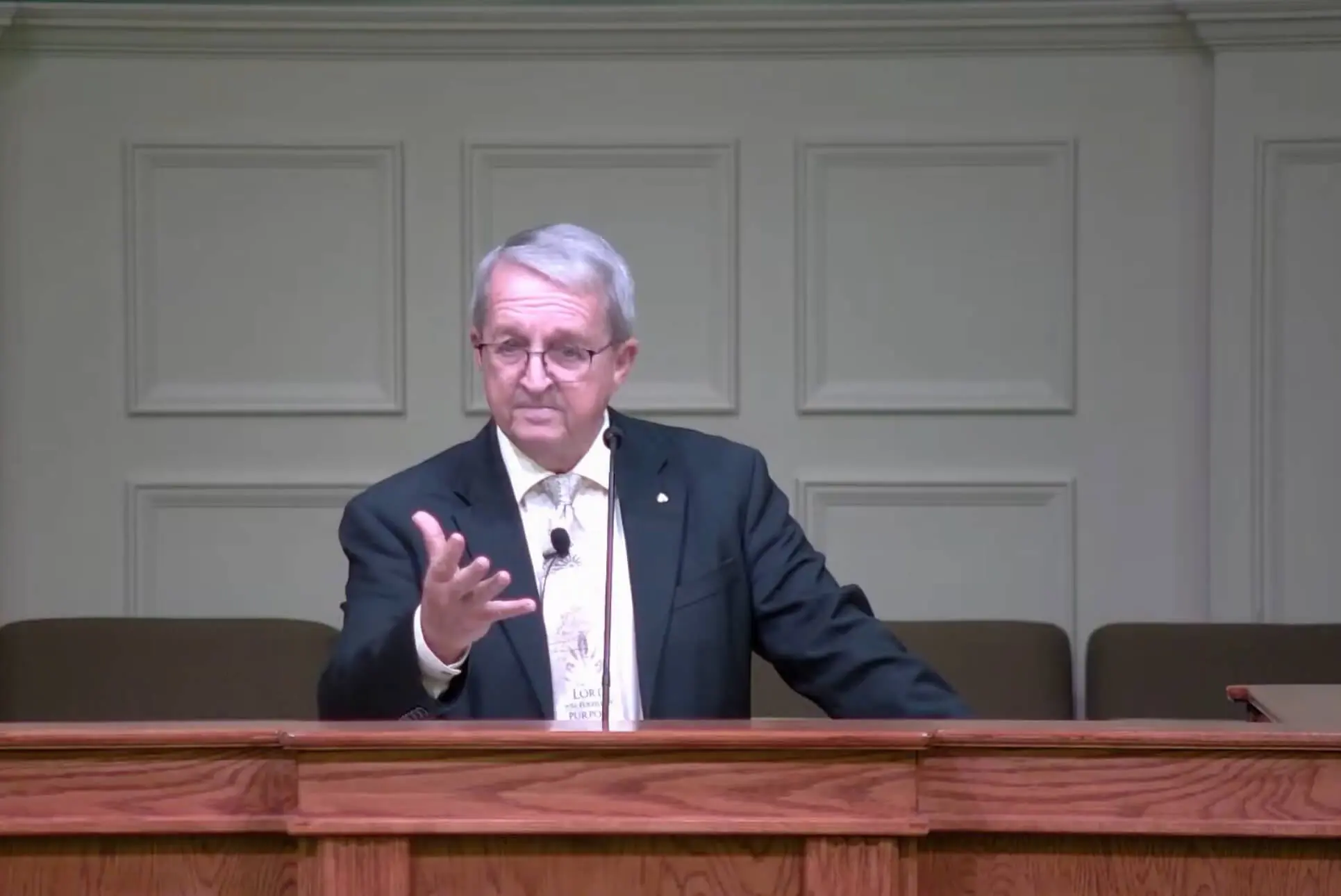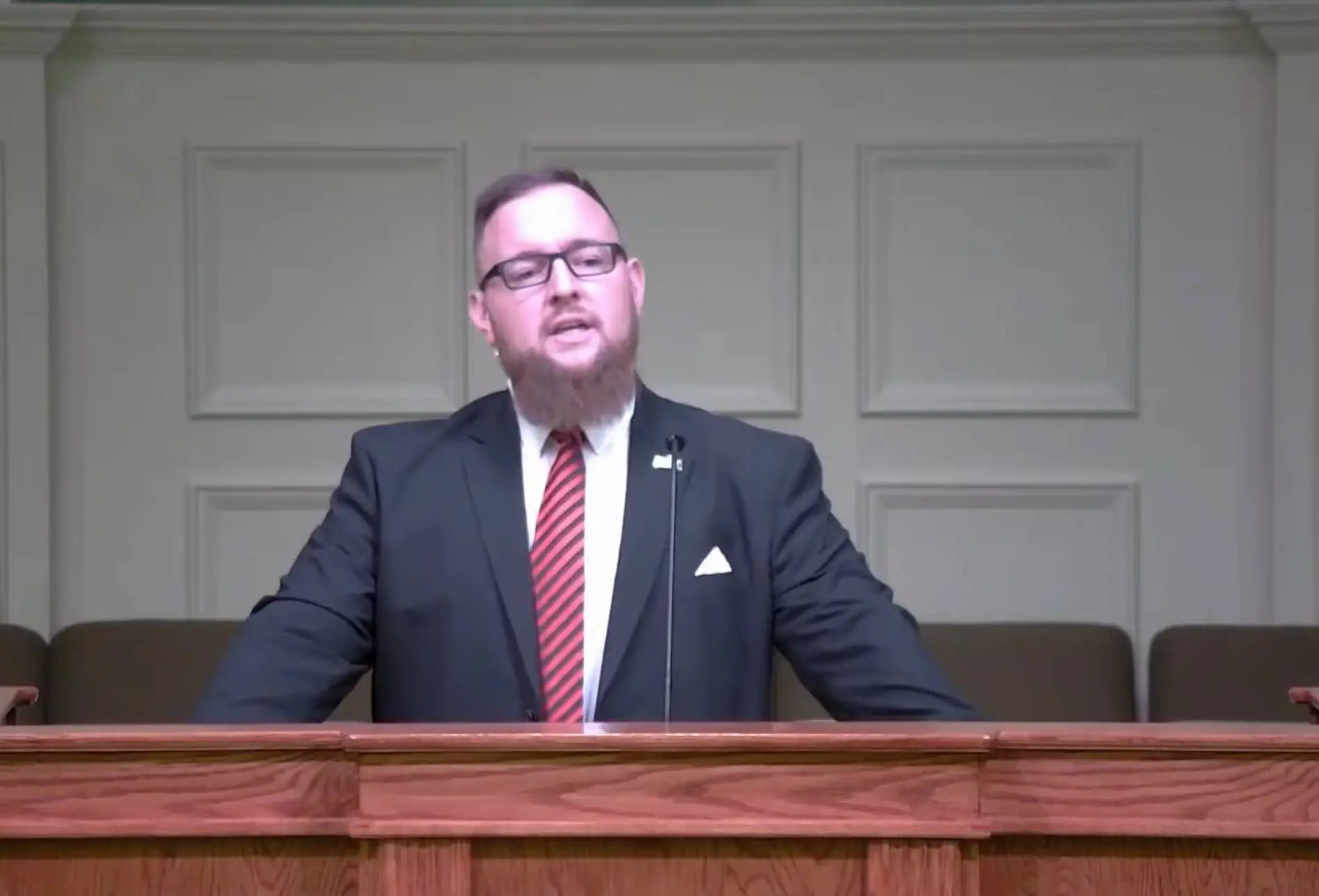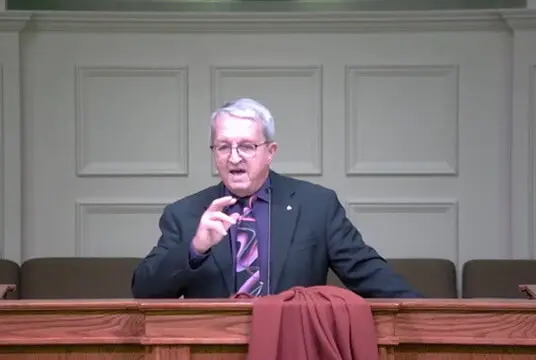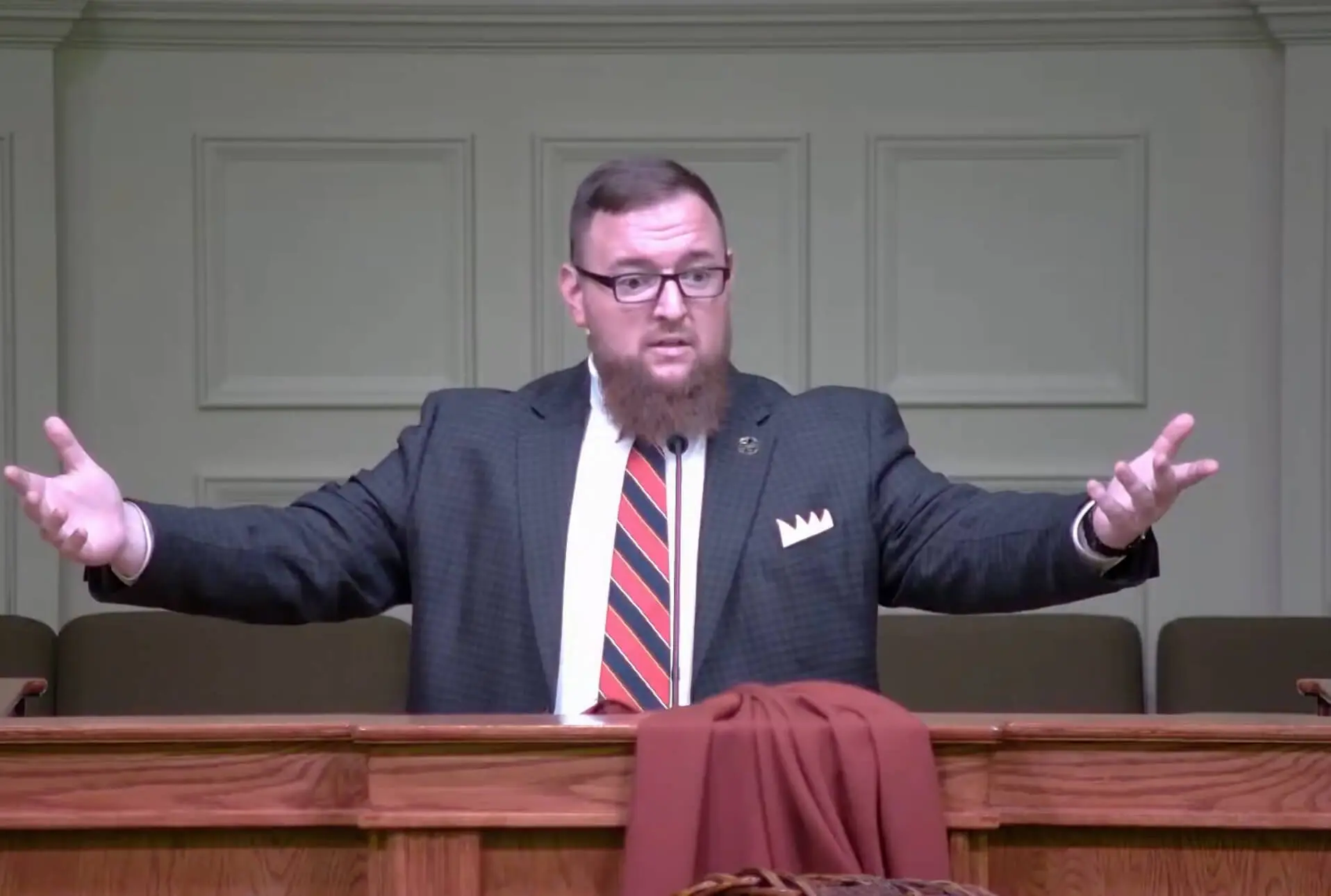Video
“The Blessed Man”
Psalm 1
Pastor Ryan J. McKeen
01/12/25
Audio
Transcript
Turn with me in your Bibles to Psalm 1. Now that we’ve sung this psalm, we sang it last Sunday morning as well, but as I prepared this week’s sermons, I decided to preach on Psalm 1 and so I wanted to sing it again. And as we see, this psalm Right at the very beginning of a book that is different than any other book in the whole Bible, where it’s really a compilation of all these different Psalms or poems or songs, and they’re all put together.
Have you ever thought about why is Psalm 1 Psalm 1? Why is it first? Why were they arranged in the way that they were? Now, we know that They weren’t arranged in chronological order. Psalm 1 is not the oldest Psalm. It’s not the first one written. We know Psalm 90 is written by Moses, and he predates David and everyone else that wrote in the Psalms. So we know that Psalm 1 is not the oldest of the Psalms. So why are they in the order that they are?
You could think about the different themes that are in the Psalms and the different topics that they focus on. In the church today, We need help with our praise and how to praise God, so why not have Psalm 150 first? That would be a good one to put first if that’s your goal. Or for worship, we have Psalms like Psalm 100 or Psalm 95 that are worship-focused, so why not stick those first? Or maybe we need help with our own human needs and struggles and trials, so something like Psalm 73. Or maybe we should start with a view of God’s greatness, God’s majesty. So you have like Psalm 139, which we sang this morning, that focuses on the greatness and incomprehensibility of God, and something like that would be good to start off like that. But why is Psalm 1 Psalm 1? Why do we have them in the order that we do and why specifically is this one first?
And I think that as they compiled the Psalms and put them together, and you can read, there’s a lot of different studies that have been done as to the order, the logical flow of the Psalms. There’s five different books that have been kind of divided out within the Psalms, that they’ve kind of ordered it that way, but there’s a lot of different opinions that you could go with, that different people have come to different conclusions. But I think something that, makes sense and stands out is the topic of Psalm 1. And I think they put it at the beginning because it’s very important for the Christian. It’s very important for God’s people. It’s really first things first. We need to get this straight before we even think about anything else in the Psalms. We need to get this in order first.
Think about it this way. This past year, on the last week of November. And all the local sports, whether it’s newspapers or stations, all of their headlines that week, the first stories they were talking about, was the Florida versus Florida State game. That was that week. So why was it that that game was the headline for all of our local places around here? Were they the best teams playing that week? Certainly not. Not this year. There were far better teams playing that week. We had Michigan and Ohio State, Texas and Texas A&M, Notre Dame and USC, Alabama and Auburn. A lot of great games that week. So why was everyone in our local stations talking about Florida and Florida State? There were a lot better football games on, too, because that game wasn’t even that good of a game. So why were they getting the headlines?
Well, because to people here, that is what was most important. That is what was most important to the people in our context. And I think when you look at something like Psalm 1, you see that the material is of utmost importance. And so that’s one way that we can think about why when we come to the book of Psalms, this is first. This is right off the bat what we see as we open a book that is so compiled like this. And in this book, what we see is two ways. We see two ways, we see two different kinds of people, and we see two eternal destinies. to places where you will end up, to realities. And if you don’t get the first Psalm right, then the rest of them aren’t going to matter.
If you’re not in the congregation of the righteous, as this Psalm says, if you’re not one of God’s people, you’re really not going to care about everything else that’s in the Psalms, whether it’s worshiping God correctly, thinking through our own troubles and trials and all the different things we read through the Psalms, well, first of all, you got to be one of God’s people. And that’s what we see in Psalm 1, that laying out the instructions for those who read as to what these two ways are and how it is that you can find yourself on the right way and what that looks like.
Jesus spoke about this issue in Matthew chapter 7. Near the end of the Sermon on the Mount, Matthew 7, verses 13 and 14, he said this, enter through the narrow gate. For the gate is wide and the way is broad that leads to destruction. And there are many who enter through it. For the gate is narrow and the way is constricted that leads to life. And there are few who find it. And that’s what we see in Psalm 1, two ways. And as Jesus said, there is a broad way that many people find. It’s the easy way, and it leads to destruction. But then there’s the narrow way that is constricted, but it leads to life. And there are only two ways that Jesus describes here.
That’s it, only two. You are one or the other. It is black and white. And Psalm 1 tells us the difference between the way of the righteous and the way of the wicked. It’s like saying, first things first, let’s get this clear. Before we open up and go into the songs of God’s people, let’s make sure we’re talking about God’s people here. Nothing is so important as you belonging to the congregation of the righteous, as the psalmist says, or to the people of God. And we know that this psalm contrasts the righteous and the wicked, but I think that contrast is secondary. The focus of this psalm is the righteous, the righteous man, the blessed man. The contrast that comes is only to exemplify what the psalmist is trying to highlight, and that is the way of the righteous.
As we study this psalm, we will emphasize that righteous way, the blessed man and the way that he walks. You’ll see three different divisions in this psalm, really three progressions. First, we start with number one, the direction of the righteous. Really, where does he get his direction from? Where is he getting informed from? Then number two, the description of the righteous. So because he listens and gets his instructions from a certain place, this is what he is like. And then lastly, we have the destiny or the destination of the righteous. And so that’s how this Psalm really breaks down. And we’ll see that as we get into it.
So let me read for us Psalm 1, Psalm chapter 1. This is the word of the Lord. How blessed is the man who does not walk in the counsel of the wicked, nor stand in the way of sinners, nor sit in the seat of scoffers. But his delight is in the law of Yahweh, and in his law he meditates day and night. And he will be like a tree firmly planted by streams of water, which yields fruit in its season. and its leaf does not wither, and whatever he does, he prospers. The wicked are not so, but they are like chaff, which the wind drives away. Therefore, the wicked will not rise in the judgment, nor sinners in the congregation of the righteous. For Yahweh knows the way of the righteous, but the way of the wicked will perish.” This is Psalm 1, and as you see, The focus of the psalmist here is to tell us about the righteous, to tell us about the man who is blessed.
First, it focuses on what the righteous is like, and then on what he is not like. And it does contrast these two ways and reveals two destinies in the end. But first, we see the direction of the righteous, the direction of the righteous. Here, the psalm shows where the righteous man gets his instructions for living, what drives him, what moves him and leads him along. Interestingly, he begins with a negative. He begins with a negative sign, and you’ll see what I mean when he says, how blessed is the man who does not walk in the counsel of the wicked. nor stands in the way of sinners, nor sit in the seat of scoffers.” The righteous man, first of all, is described by what he rejects. What he rejects.
And the psalm begins with how blessed. How blessed is the man. Now this is not talking about he’s got some sort of special status. that he has some sort of extra blessing. It simply means happy. How happy is the man? How happy is the man who does not walk in the counsel of the wicked? If you remember a couple of years ago, Pastor Piatt was preaching on the Sermon on the Mount, and in the Sermon on the Mount, you have all the Beatitudes, and each one of them starts with this word, blessed. And it’s this idea of happiness. True, God-given happiness.
You see the list of the Beatitudes in Matthew chapter 5. Blessed are the poor in spirit, for theirs is the kingdom of heaven. Blessed are those who mourn, for they shall be comforted. Blessed are the lowly, for they shall inherit the earth. And so on and so forth. How blessed is the man. The blessed man is the happy man. The happy man is a separated man. He’s a man who is distinct from evil, a man who’s not neutral on these things, but someone who is biased against evil in all of its forms. You see three different clauses here. Poetry lists out the different ways in which the man is blessed.
First of all, you see how blessed is the man who does not walk in the counsel of the wicked. The counsel of the wicked has to do with our way of thinking, with forming plans, with a mindset, with the way that we look at things, the way that we look at the world. And how blessed is the man who doesn’t walk in the counsel or the instruction of the wicked, who doesn’t listen to the wicked when he’s thinking things through, when he’s trying to make decisions. He does not listen to the wicked. And then it says, nor stand in the way of sinners. How blessed is the man who doesn’t stand in the way of sinners. This way of sinners talks about now their behavior.
So originally it was their counsel, their instruction, their advice. Now it’s their actions. Not only does he not listen to the wicked, he doesn’t do what the wicked do. He doesn’t follow their pattern of behavior. He doesn’t follow their example. Thirdly, he says, nor sit in the seat of scoffers. This seat of scoffers shows a sort of belonging. He’s not walking, he’s not standing, and he’s certainly not sitting with the scoffers. It’s a place where you settle in and you get comfortable, where you feel at home. And the blessed man does not feel at home with scoffers. A place that has no interest in godliness or faithfulness. And you see these three verbs here, walks, stands, and sits. This is meant to signify all of your life.
Yes, it’s a progression. But no part of the blessed man’s life involves the wicked. Whether it’s listening to advice, following its ways, or even adopting their attitudes as your own. The righteous man has no part of this in his life. The walking, the standing, or the sitting. None of it is influenced by the wicked. This is our personal holiness. What we choose to surround ourself with, who we choose to surround ourselves with, what we choose to listen to, what we choose to watch. All of these things are input into our lives. And the psalmist is telling us, the less input you have from these wicked sources, the more blessed you’re going to be, the happier you will be.
And this walking, standing, and sitting, it is a progression. It’s three degrees of departure from God. Because at first, you’re walking. But when you think about the counsel you receive, then you stop and you stand a while. But then you get comfortable and you sit down. And you make that place where you reside. This is the progress of wickedness. And notice the negative. How happy is the man who does not? He does not. Now, often you’ll hear, well, people shouldn’t know you’re a Christian by what you’re against. I mean, that’s not what the Bible says. Yes, they should know what we’re for as well, but they ought to know what we’re against.
This man is counter-cultural, if you will. He’s different. He’s not just nice and easygoing and tolerant. He resists evil. He flees from evil. He resists peer pressure. This counsel of the wicked, and the way of sinners, and the seed of scoffing, that’s peers around you pressuring you to do things you don’t want to be doing. There was once a story told of a very elderly lady And when she was asked what was the best thing about being 104 years old, she said, no peer pressure. But this righteous man has plenty of peer pressure, but he chooses not to go in their way.
And you have to remember that this lure of the wicked It doesn’t usually appear in its worst and most vile form at first. Most often, you’re not seeing the worst part of wickedness, and that’s what draws you to it. It’s little by little. It’s slowly. It’s the things that feel comfortable, that feel good. And you don’t sometimes notice that it was even wicked in the first place. It may come as a minor nudge from people in your life. Teachers, friends, family, colleagues, your boss, perhaps your spouse.
And it might just simply mean that if you don’t think this way, the way the rest of us think, Well, that just proves you’re just not as intelligent as we are. If you don’t act this way, if you don’t do what we do, you won’t be accepted anymore. If you don’t laugh at what we laugh at, you’re the weird one. You see, verse one is not just a description, it’s a warning. We ought not to walk in the counsel of the wicked, or stand in the way of sinners, or sit in the seat of scoffers.
This is really the Psalms version of Romans 12:2. Really, it’s the other way around. Romans is kind of an explanation of what we see here in the Psalms, since it came later. Romans 12:2 says, do not be conformed to this world. Be transformed. by the renewing of your mind so that you may approve what the will of God is, that which is good and pleasing and perfect.” A verse we know well. Well, that’s what we see here in Psalm 1. If you want to approve what the will of God is, you won’t approve the wicked. So we see this first verse is the negative side. A blessed is the man who does not. But there is a positive as well.
So this is speaking of the direction of the righteous, where he gets his information and instruction from. So we know where he shouldn’t get it from, where he is not to get it from, and that’s the wicked. But verse two gives us the positive. But his delight is in the law of Yahweh. And in his law, he meditates day and night. His delight is in the law of Yahweh. A lot of your versions say the law of the Lord. So what is it that causes him to reject the ways of the wicked? How does he know what the ways of the wicked are? The word of God. His delight is in the word of God. He is pursuing his pleasure in God’s word. He is not so concerned about the pressures coming at him that he forgets where his pleasure is really found. It says his delight. It’s his delight.
Listen, you’re gonna take your directions from somewhere. You’re going to get input from something. That’s the way we work. And the righteous man takes his directions from the law of God. This is that word Torah, rather than the counsel of the wicked. So what is this talking about? The Torah of God. And we usually translate it law, which it sometimes means law. But law in our English setting is a little too constrictive for what the fullness of this word really means. It’s really talking about all of the instruction from God. We sometimes use the law to speak of the Pentateuch, the first five books of the Bible.
But even in there, we know there’s more than just laws. There’s narrative and there’s exhortation and all sorts of different things. But this is a word to generally speak of God’s word. It’s in God’s word that he meditates, that he delights the teaching of God. Existence is not boring. He’s not sitting around all day just reading the Bible and that’s all he ever does. But that’s where he finds his delight. He delights from thinking about and meditating on what God’s word says.
And his delight is not just a feeling. It’s a deep-seated joy. found in his dedication to God’s word. You see there in verse two, in his law, he meditates day and night. He’s thinking it over and over. He’s not just reading it to get it done for the day and moving on. He’s meditating on God’s word, being sure about what it says and what it’s teaching me to do. And he does this day and night, regularly, consistently. This is a part of his life. total immersion in the Word of God. That’s where the righteous man’s pleasure and delight is found.
So, the counsel of the wicked or the Word of God? Which drives your life? The experts? or God’s word? What’s your authority? Where do you get your direction from? Which do you know better? What the news says or what God’s word says? So we’re speaking on the direction of the righteous. What is giving you your direction? Something to think about as we read a psalm like this. So that’s number one.
Secondly, because of the direction of the righteous, we find the description of the righteous in verse three and four. And he will be like a tree firmly planted by the streams of water, which yields its fruit in its season, and its leaf does not wither, and in whatever he does, he prospers. So we see a picture here of the righteous. Verse four is a picture of the wicked. But first we see this blessed and happy man and what his life looks like because of verses one and two.
The result of having the right directions in your life, rejecting the ways of the wicked, meditating on God’s word, what will it produce in your life? Well, it’ll make you like a tree. The righteous man is like a tree. You see all these descriptions of this tree. He is firmly planted. He is by streams of water. It yields its fruit in its season. Its leaf does not wither. And in whatever he does, he prospers. So you see he’s firmly planted. He has stability in his life. Because he is grounded in the word of God, He meditates on it. He finds his delight in it.
He is firmly planted. So he has stability. By streams of water means he’s got life. He has vitality in his life. His life is worth living. He gives fruit in its season. He’s a productive man. He does not wither. He’s durable. And in all that he does, he prospers. In all that he does, he prospers. Now this don’t, as we know from wisdom literature, this is not a promise that if you find your delight in God’s word, you’re gonna be happy, healthy, wealthy, and wise. But generally, you will prosper. You’ll be a prosperous person. This is not a get-rich-quick formula. But you will be prosperous in the ways of the Lord. And generally, this man will have success because he’s on the right way. He’s following the right way.
It’s interesting to think about these characteristics. Stability and vitality. Or life worth living. Sometimes we set these things in opposites to each other. Like we might think that, well, creative people, they’re not very organized. Well, sometimes that’s true. Like, oh, she’s artsy, so you can’t expect her to show up on time. Or, well, he’s Mr. Organized, so you can’t expect him to be any fun. But here you see all of these things true of the righteous man. The man who is informed by God’s word. The one who says no to the world and yes to God’s word. The one who has the right direction in his life. He’s both grounded and alive. Stability doesn’t have to be boring and vitality doesn’t have to be chaotic. Then you see verse four. Verse three describes the righteous. Then you see verse four, this is a reverse of verses one and two.
We started with the negative and went to the positive, and now it’s the positive first, and now we get to the negative. The wicked are not so, but they are like chaff the wind drives away. The wicked are like chaff, so this is another picture. First we had a picture of a tree, and now we have a picture of chaff. This is from the threshing floor. Remember from the story of Gideon, where he was threshing the wheat down in the wine press. In the process of threshing, they would throw it up in the air, and the seeds and all the things they needed to harvest that were heavier would fall, and the chaff would blow away. Everything that was worthless would blow off, and they didn’t need it, so it would be gone.
So if the tree here, in verse 3, Describes or represents stability and durability and vitality and all these things we talked about We see in verse 4 chaff It’s really the opposite Instability Lifelessness Worthlessness And notice the descriptions here you have four clauses to explain the righteous man and one to just explain the wicked. The wicked are like chaff, blown away, forgotten, gone. Chaff is worthless. It’s disregarded and it’s thrown away. And this is a picture of eternity. This is true in light of eternity. That those who choose not to follow the ways of God, who choose to live the life of the wicked, who never come to Christ, they will be blown away like chaff. This is the opposite picture of the righteous.
Thinking of this picture of what the righteous life is like, if you remember a few months ago I preached on Psalm 92. And that has a very similar description comparing the righteous man to a tree. And I’ll read that again, Psalm 92:12-15, just a few verses here. The righteous man will flourish like a palm tree. He will grow like a cedar in Lebanon, planted in the house of Yahweh. They will flourish in the courts of our God. They will still yield fruit in old age. They will be rich and fresh. To declare that Yahweh is upright, He is my rock and there is no unrighteousness in Him. This is just a fuller description of exactly what we see in verse 3 here. They are planted and they are continually bearing fruit. So this is true of the righteous man.
This is true of very many believers. Believers who are in their later years, who’ve been walking with the Lord for a long time, and they continually bear fruit. They continually bless those around them. I can’t help but think of our brother, Bob Russem. That man blesses me every single week, every single time I see him. He is continually bearing fruit. That’s what the righteous are like, like a tree. That’s the description we see of the righteous.
And now, lastly, we have the destiny. Again, these are a progression. First, you have the direction, where the righteous gets his directions from. And because of that, we have a description, what they’re like now. And because of that, we see their destiny, where they will end up. Verses five and six. Therefore, the wicked will not rise in the judgment, nor sinners in the congregation of the righteous. Yahweh knows the way of the righteous, but the way of the wicked will perish.
So again, you have a flip again to the negative first. It’s really interesting the way that Hebrew poetry works, and there’s so many parts to it. But you see, verse five starts with therefore. Therefore, it’s connecting back to the verses we’ve already covered. Because of all that, therefore, these things are true. All of this, the two ways, the way of the righteous and the wicked, it all leads to this. The wicked will not rise in judgment.
We see this reference to the judgment, This is what we know of as the final judgment. This is your eternal destiny. This is why Psalm 1 is so important. This is everything. This is what it’s all about. This is no religious game we’re playing. It’s not choose the religion you like and the one that makes you happy and we’ll all end up at the same place in the end. The psalm asks us, what are you going to do when the end comes? What’s it going to be like for you?
This is like the prophet Jeremiah when he confronted the wicked rulers and leaders of his day. Jeremiah 5, this is such a profound passage, and he’s confronting the people of Israel to their face. Verse 31 of chapter 5, he says, the prophets prophesy with lying, and the priests have dominion by their own hand, and my people love it so. This is what Israel’s like at this point. He’s pointing out their sin to them, but then he says, but what will you do at the end of it? You love this way of life? The prophets are lying. The priests have no authority except their own hand. You love that? What are you gonna do at the end? Consider the end.
Are you ready for the judgment? Some people are not. Some people are not ready. Some people don’t like to think about it. Pay attention to the way the wicked are depicted here. They will not rise in the judgment, nor sinners in the congregation of the righteous. They have no justification. They will not stand. They have no part of the fellowship of God’s people. They’re cut off, outside the community of God’s flock.
And lastly, in verse 6, For Yahweh knows the way of the righteous, but the way of the wicked will perish.” They’ll perish eternally. This division between two types of people, it’s important to realize it’s not just an outward appearance. It’s not just what it looks like on the outside. It’s not just looking at who goes to church and who doesn’t. In this context, this psalm is addressed to Israel. But it’s not talking about the Israelites and all the other nations. It’s talking about those who are truly righteous. Those who are more than just outwardly numbered with God’s people. That’s why he brings this comparison.
They won’t rise in the judgment and they won’t stand in the congregation of the righteous. They might stand in the congregation of the righteous now. They might be among God’s people. But in the judgment, God will sort out the sheep and the goats. This is those who have been born again and those who have not. Because you can be numbered among God’s people outwardly, and yet still be one of the wicked.
Going back to Matthew 7, again, Jesus talked about this as well. It’s almost like Jesus knew his Bible. Because in verses 21 to 23 of Matthew 7, Jesus said, not everyone who says to me, Lord, Lord, will enter the kingdom of heaven. But he who does the will of my father who is in heaven will enter. Many will say to me on that day, Lord, Lord, in your name did we not prophesy? And in your name cast out demons and in your name do many miracles. And then I will declare to them, I never knew you. Depart from me, you who practice lawlessness.
There are those who are numbered among the congregation of the righteous, who say, Lord, Lord, who do the things and say the things. They look good. They sound good. But inside, I never knew you. Those who think that Jesus is my get out of hell free pass. That yeah, I’ll claim him so that I don’t go to hell, but other than that, leave me alone. I’ll do what I want to do. I’ve got things I want to accomplish in life. I’ll worry about that later. Claiming Jesus as their savior, but never, living as though he’s their Lord. That he’s the one that gets to say what you do and don’t do. That he’s your master, that you are owned by him.
And the only way to truly be numbered with the righteous, as one of God’s people, is to come to Christ as your Savior, to believe in Him. And then because of your change of heart, live for Him. Because as Jesus just said there in Matthew 7, it’s one thing to say, Lord, Lord, to claim, I know Jesus. That’s what they’re doing. Claiming, Lord, Lord, look at all these things we did in your name. We did it in your name. We told everyone we’re Christians. We did the Christian things. It’s one thing to claim to know Him, but does He know you? Does He have your heart?
In John chapter 10, I’ve been in John a lot lately. A lot of these passages come to my mind when I’m thinking about these things. John chapter 10. Jesus says, I am the good shepherd. I know my own and my own know me. Does he know you? Does he know you? Does he have your heart? Does he have your trust and your commitment? Do you live like that’s true? Do you live as though He is your Lord? That is really what the way of the righteous is. It’s a description of those who live as though Jesus is their Lord. It’s not just living by some rules. Pharisees and religious leaders did that. And Jesus confronts them.
And in one of the friendly confrontations of a Pharisee, Nicodemus, Nicodemus comes to him and wants to know more, John 3, and Jesus tells him, truly, truly, I say to you, unless one is born again, he cannot see the kingdom of God. And a few verses later, after Nicodemus pushes back and is confused, Jesus says, you’re the teacher of Israel, and you don’t understand this? You say, Lord, Lord, Nicodemus, and you don’t understand this. When Jesus truly has your heart, you live like it.
Verse six, for Yahweh, knows the way of the righteous. He knows. But the way of the wicked will perish. This doesn’t just mean that God has some knowledge of what the righteous ought to do. This means He knows them. He knows every step they take. All the way along the road that they’re on, the way of righteousness, He’s with them. He knows them every step. God is ultimately and personally concerned about every step the righteous makes. He’s there with them. He knows you.
And the God who cares about every step the righteous make in this life, will be there with him in the judgment. That’s where the hope in Psalm 1 is found. Yahweh knows the way of the righteous. He knows him. And he will be preserved in the end and not perish like the wicked.
This is Psalm 1, the very first Psalm in this book. It’s almost an introduction. to all the other things that Psalms contains, and it contains a lot, but until you get this right, the rest of it’s not gonna matter. These are serious matters. The first word of this Psalm is blessed, and the last is perish. These are first things. of first importance, and we need to face them now.
So make sure you truly are among the congregation of the righteous. You are truly God’s people, that you know him, and that he knows you. How do you get into the congregation of the righteous? You come to Jesus, who says, I am the door. Anyone who enters through me will be saved. No one comes to the Father except through me.
Let’s stand and close in a word of prayer this evening. Our Father in heaven, we thank you for Psalm 1, this very first Psalm in this tremendous collection of your worship songs. I pray that we would seriously consider what this psalm has to say. That we would be careful of where we get our direction from and that we would seek to meditate on and find our delight in your word. That we would reject the ungodly counsel that we find all around us. And that we would look to live like the description of the righteous man in this psalm, that we would seek to be vibrant, healthy, productive followers of you throughout our life. And we thank you for the hope that it provides us, that you know our way, you know our end, and that we can trust you to be with us as we seek to follow you, and that you will be with us in the judgment. Lord, we thank you for who you are, for the way that you’ve revealed yourself to us in your word, Pray all these things in Christ’s precious name.

